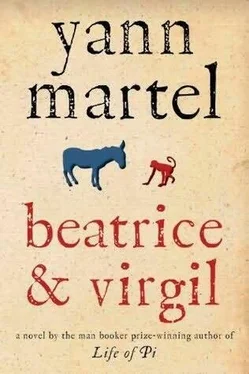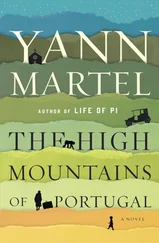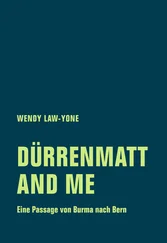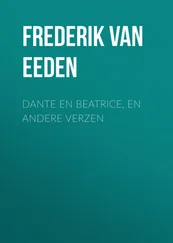Yann Martel - Beatrice and Virgil
Здесь есть возможность читать онлайн «Yann Martel - Beatrice and Virgil» весь текст электронной книги совершенно бесплатно (целиком полную версию без сокращений). В некоторых случаях можно слушать аудио, скачать через торрент в формате fb2 и присутствует краткое содержание. Жанр: Современная проза, на английском языке. Описание произведения, (предисловие) а так же отзывы посетителей доступны на портале библиотеки ЛибКат.
- Название:Beatrice and Virgil
- Автор:
- Жанр:
- Год:неизвестен
- ISBN:нет данных
- Рейтинг книги:5 / 5. Голосов: 1
-
Избранное:Добавить в избранное
- Отзывы:
-
Ваша оценка:
- 100
- 1
- 2
- 3
- 4
- 5
Beatrice and Virgil: краткое содержание, описание и аннотация
Предлагаем к чтению аннотацию, описание, краткое содержание или предисловие (зависит от того, что написал сам автор книги «Beatrice and Virgil»). Если вы не нашли необходимую информацию о книге — напишите в комментариях, мы постараемся отыскать её.
A famous author receives a mysterious letter from a man who is a struggling writer but also turns out to be a taxidermist, an eccentric and fascinating character who does not kill animals but preserves them as they lived, with skill and dedication – among them a howler monkey named Virgil and a donkey named Beatrice…
Beatrice and Virgil — читать онлайн бесплатно полную книгу (весь текст) целиком
Ниже представлен текст книги, разбитый по страницам. Система сохранения места последней прочитанной страницы, позволяет с удобством читать онлайн бесплатно книгу «Beatrice and Virgil», без необходимости каждый раз заново искать на чём Вы остановились. Поставьте закладку, и сможете в любой момент перейти на страницу, на которой закончили чтение.
Интервал:
Закладка:
"Tell me, how do Beatrice and Virgil change over the course of the play?" Henry asked.
"Change? Why should they change? They have no reason to change. They've done nothing wrong. They're exactly the same at the end of the play as they were at the beginning."
"But they talk. They notice and realize things. They reflect in quiet moments. They gather up the items that go into the sewing kit. All these change them, no?"
"Absolutely not," the taxidermist said firmly. "They're the same. If we had met them the next day, we would have said they were no different from the previous day."
Henry wondered what his creative writing friend would have said at that moment. He had found three good words, more than that, in fact, but no story was coming from them.
"But in a story, the characters-"
"Animals have endured for countless thousands of years. They've been confronted by the most adverse environments imaginable and they've adapted, but in a manner absolutely consistent with their natures."
"That's true in life. I fully agree. I have no doubts about the organic workings of evolution. In a story, however-"
"It is we who have to change, not they." The taxidermist seemed flustered.
"I agree with you. There's no future without an environmental conscience. But in a story-here, take Julian in the Flaubert story you sent me. Over the course-"
"If Virgil and Beatrice have to change according to someone else's standards, they might as well give up and be extinct."
At that moment, it was Henry who gave up. "Yes, I see your point," he said, to placate the taxidermist.
"They do not change. Virgil and Beatrice are the same before, during and after."
Henry looked at the list again.
"Where's this '68 Nowolip-'" he was about to ask, to change the topic, but the taxidermist abruptly raised the palm of his hand in the air.
Henry shut up. The taxidermist got up and came round to his side of the desk. Henry felt a slight measure of apprehension.
"Only one thing really counts," said the taxidermist. It was nearly a whisper.
"What's that?"
The taxidermist slowly pulled the page from Henry's hand. Henry let it slide through his fingers. The taxidermist laid it on the desk.
"This," he said.
He took the lamp in one hand and with the other he ran his fingers against the direction of the fur at the base of Virgil's tail.
"This here," he said.
Henry looked. On the skin now exposed was a stitch, a suture, that circled the base of the tail. It looked purple, medical, horrible.
"The tail was cut off," the taxidermist said. "I reattached it."
Henry stared. The taxidermist put the lamp back on the counter and walked over to a table at the far end of the workshop. Henry reached and touched Virgil's fur, meaning to smooth it down, but instead he pushed it back to look again. He didn't know why he did this, but he looked and then he touched. A shudder went through him. He pulled his fingers back and patted the fur down. He felt gutted. How utterly barbarous to do that, to cut Virgil's splendid tail off. Who would do such a thing?
Henry wondered why the taxidermist had stopped telling him about his play. He was standing in front of a table, handling something. Had Henry been too hard on him? Insensitive to his struggles?
"Why don't you let me read your play, or what you have of it?"
The taxidermist didn't answer.
Was it the feeling that he would be revealing the treasure he'd been working on his whole life, and that once it was out, he'd be left empty, without secrets, bereft? Was he afraid of the exposure of his inner self? Of Henry's and other people's reactions? "Years of work and this is all you have to show for it?" Was he sensing the failure of his enterprise, for a reason he could not determine and with no solution he could imagine? Henry realized he couldn't answer any of these questions because he had no sense of the taxidermist's inner self. The man, despite the play and the conversations they'd had, remained a mystery to him. Worse: a void.
"I should…" Henry began to say, but he trailed off. At every visit, the taxidermist swallowed up so much of his time. He got up and moved to where the man was standing.
He was working on a red fox. It was lying on its back and he'd already made a cut along its stomach, from the lower ribs to the base of the tail. He began to lift the skin off the body, using his fingers and the knife. Henry watched him work with morbid fascination. He'd never seen a freshly dead animal so close up. The taxidermist pulled the skin away until he reached the base of the tail, which he cut from the inside with the knife. Then he worked on the legs until he reached the knee joints, which he cut through. There was little blood. Pale pink-muscle, Henry guessed-and streaks of white-fat-predominated, with only here and there spots and patches of deep purple. Henry thought the taxidermist would now continue upwards with the ventral cut, to the base of the neck, slicing the chest area open and doing there to the front legs what he had done lower down to the back ones. Instead the taxidermist started turning the animal's skin inside out, easing the body through the ventral cut, separating skin from body with the knife as he went along. The skin was coming off the animal like a pullover. When he reached the front legs, he severed the legs at the shoulders and continued peeling the animal's skin off the neck. At the head, he cut where the ears were attached to the skull. Two dark holes were left behind. The eyes were a weirder sight. Whereas the fox's ears, their outer structure, went with the skin, the eyes remained behind, staring out even more now for having their eyelids removed. The taxidermist artfully cut the only place in the eyes where skin and body were linked: the tear ducts. Then the mouth was released, the blade cutting through the skin next to the gums. Lastly, the nose, the final point of attachment, was dealt with, the black skin skinned off and the cartilage cut through. He returned the skin to its natural shape, inside in, and there they lay, side by side, the skin and the flayed carcass, like a baby that has been taken out of its red pyjamas, only a baby fiercely staring with the blackest eyes and displaying a full set of teeth.
"I've done this for you," the taxidermist said. "It's a head mount. All I need is the head."
He picked up a scalpel and made a small cut at the base of the fox skin's throat. Then, with a pair of small, sharp scissors, making sure not to cut through fur, but only through the skin at its base, he cut the fox's skull-less head off. He turned the head inside out again, including the ears. Picking with his fingers and scraping with the side of the knife, he cleaned flesh and fat off the skin.
"Need to treat it," he muttered. He walked over to a shelf of jars.
Henry stared at the head. It was a fox's head, but emptied and turned inside out. A snout, a mouth, eyes, large ears, a neck-but all wrong, all inside out. Henry could see white fur inside the mouth, where a tongue should have been, and at the neck cut he could see red fur bursting out. The rest was the peeled head, pink and raw, of a formerly sentient being. The ears, despite being the largest features, were inexpressive. But the eyes, the eyelids rather, were closed, while the mouth was open, as if in a scream. He looked at the neck cut again, at the red fur emerging from within. A soul on fire, he thought. The head suddenly became that of a being caught in its moment of greatest agony, shuddering uncontrollably, beyond reason and beyond help. A feeling of horror overcame Henry.
The taxidermist came back with a small pot of white paste, quite granular. "Borax," he said, without further explanation.
With one hand inside the fox's head and the other wearing a rubber glove, he began to apply the paste to the animal's head, rubbing it in vigorously.
Читать дальшеИнтервал:
Закладка:
Похожие книги на «Beatrice and Virgil»
Представляем Вашему вниманию похожие книги на «Beatrice and Virgil» списком для выбора. Мы отобрали схожую по названию и смыслу литературу в надежде предоставить читателям больше вариантов отыскать новые, интересные, ещё непрочитанные произведения.
Обсуждение, отзывы о книге «Beatrice and Virgil» и просто собственные мнения читателей. Оставьте ваши комментарии, напишите, что Вы думаете о произведении, его смысле или главных героях. Укажите что конкретно понравилось, а что нет, и почему Вы так считаете.












